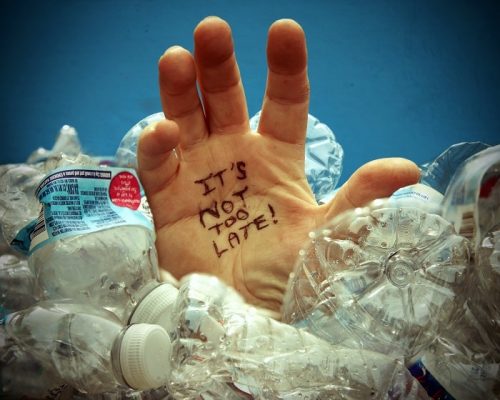
Photo by Boyce Duprey.
Think globally, act locally—local garbage has Global implications
Think globally, act locally, presses people to take into account the health and well-being of the entire planet and for each to do their part in their own communities and cities.
Recycling reusable waste is good for the planet, right?
It’s something we can all do as a moral conviction, an environmental imperative, or simply a means to justify our personal over-consumption of the Earth and her resources. It makes us feel responsible, resourceful, green.
But that empty plastic bottle you dropped into the recycle bin, well, it didn’t magically disappear. Nothing does. It just goes somewhere else and becomes someone else’s problem.
That’s the opposite of “think globally, act locally.”
Our Plastic Planet
In April of this year, a Cuvier’s beaked whale and her unborn calf were found dead near the Philippines. The mother’s stomach was filled with 88 pounds of discarded plastic waste, and it’s not an isolated incident.
With an estimated five trillion tons of plastic in the world’s oceans today, fish populations are in decline, and it is estimated that by the year 2050 there will be more plastic in the oceans than fish.
The magnitude of such an environmental holocaust cannot be fully comprehended, but we are seeing horrifying glimpses of it every day.
Irresponsible disposal
While some may still naively argue the causes of global climate change, the plastic epidemic that is choking our planet is a 100 percent human-caused catastrophe. Found in virtually everything we use, plastic is the most obvious and abundant residue of a consumer-based culture, accounting for approximately 80% of all marine litter.
With 7.3 billion people on the planet, the ecological and biological consequences of irresponsible disposal are devastating.
Some countries dump their garbage in the ocean to get rid of it. Cruise ships and other large vessels discharge garbage, ground glass, human waste, oil, and other toxins directly into the sea. Fishing trawlers discard their miles-long nets by dropping them on the ocean floor, trapping animals and fish and smothering coral reefs.
Plastic bags underwater resemble jellyfish and are fatal when consumed by sea turtles and other marine animals. Seabirds eat colorful bits of plastic debris such as bottle caps and cigarette butts and die agonizing deaths as a result.
![]()
Plastic is everywhere
From snack containers to the space shuttle, from your car to the swizzle stick you used to stir your morning coffee, plastic is the most ubiquitous and toxic of all the refuse we discard.
Single-use items in particular, mostly water bottles, comprise the bulk of the literal mountains of improperly discarded plastic that clogs rivers and streams on its way to the ocean. They choke our landfills and recycling centers with non-biodegradable petroleum-based compounds that in some instances, although it may degrade into smaller particles, will never completely decompose.
Twenty tons of plastic fragments wash up on the world’s beaches each year, even in some of the most remote places on earth, killing marine mammals, seabirds and coral reefs, and contaminating the fish we eat.
The fact is we create too much trash, and that trash has come back to haunt us.
Second only to the burning of fossil fuels, the pervasive nature of plastic in the environment is so detrimental that according to Bloomberg News, the 28-nation European Union has agreed to ban single-use plastic products by the year 2021. The ban will include plastic plates, cutlery, straws, beverage cups, food containers, and personal hygiene sticks such as Q-Tips.
If this sounds extreme, consider that the typical American consumer discards roughly 4.3 pounds of garbage daily, while only 1/10 of all solid garbage in the US gets recycled. But even if every shred of plastic was conscientiously consumed and responsibly discarded, it would still be a problem.
Why?
In a recent KUTV2News story, Matt Dixon, South Ogden city manager, mentioned a cost increase from $39 per ton to more than $53 per ton being imposed by the city’s contracted recycling company.
In Dixon’s words, “It’s tough to have those external forces that put that kind of pressure on the community. Nobody wants to say they’re anti-recycling or that they don’t support recycling, but are you willing to pay $1 more a month? $2?”
Municipalities across the country once sold their plastic and paper waste to China, but those transactions came to a halt in January of last year when China declared a ban on the importation of imported garbage, citing environmental protections and public health as major concerns.
According to the New York Times, “China’s ban covers imports of 24 kinds of solid waste, including unsorted paper and the low-grade polyethylene terephthalate used in plastic bottles, as part of a broad cleanup effort and a campaign against ‘yang laji,’ or ‘foreign garbage.’ It also sets new limits on the levels of impurities in other recyclables.”
As a result of the China ban, out-of-control inventories of millions of tons of potentially recyclable waste continue to accumulate in cities across this country, while the cost to collect it continues to rise. Ogden City’s recycling program is on temporary hold while city administrators try to reconcile the 47% increase in collection fees by the current provider, which may no longer be able to ship the material overseas at any price.
In the meantime, the city will continue to collect blue bin recyclables, and Ogden residents are encouraged to continue their recycling efforts until a solution is found.
As recycling programs become overwhelmed, the admonition to Think Globally, Act Locally has never been more relevant than it is right now. Reducing our consumption of single-use plastic products and products that use plastic packaging may be crucial to the future of our planet.
Reduce and Reuse
We’ve all heard the phrase, “Reduce, Reuse, Recycle,” right? Recycling is great, but it’s no substitute for reducing consumption and reusing what you already have. Here are a few good ways you can begin to Think globally, Act locally:
- Don’t use plastic grocery bags. They’re unsightly in the environment, hazardous in the ocean, and they clog up recycling equipment.
- Buy products in boxes and glass bottles. Buy bulk items and store them in reusable containers.
- Stop using plastic straws. More than 500 million plastic straws are discarded every day.
- Don’t buy bottled water. Drink tap water, or use a filter and refill a reusable water bottle.
- Use bar soap and bar shampoo instead of soap and shampoo from bottles.
- Use a metal razor. Two billion plastic razors are discarded every year.
- Use digital sources of entertainment instead of buying CDs and DVDs.
- Give up chewing gum. Most commercial brands of gum are made of flexible plastic.
- Refill printer cartridges. They’re good for several uses before they need replacing.
- Stop using plastic cutlery. Or, wash it and reuse it.
- Don’t buy cosmetics or soaps that contain plastic microbeads.
- Use wire instead of plastic coat hangers. Most plastic coat hangers end up in the landfill.
- Newspapers are dying. Read the paper online or watch the news on TV.
- Switch to e-billing instead of receiving paper statements.






